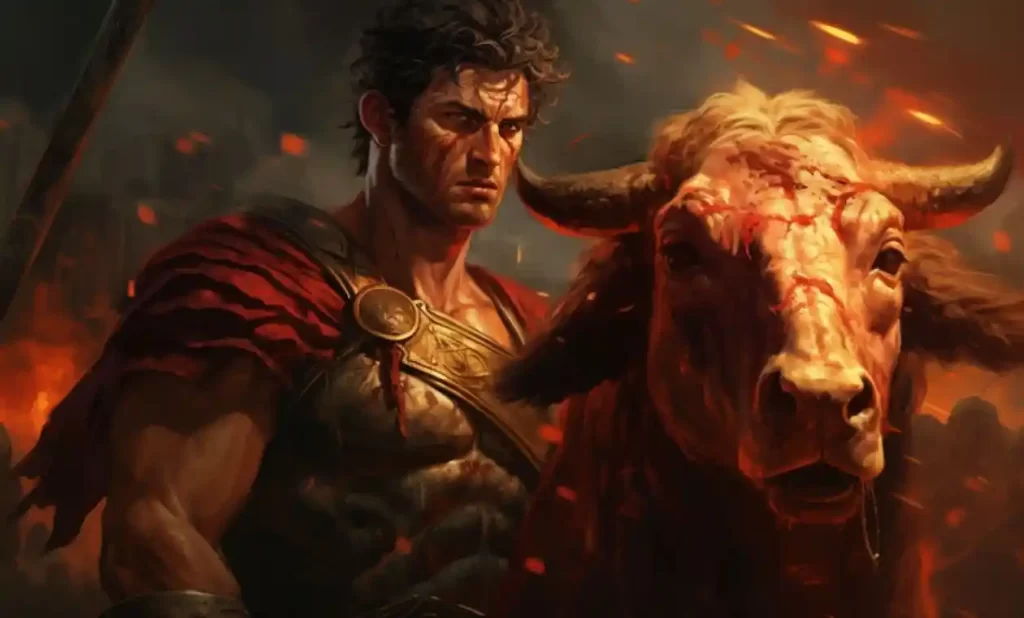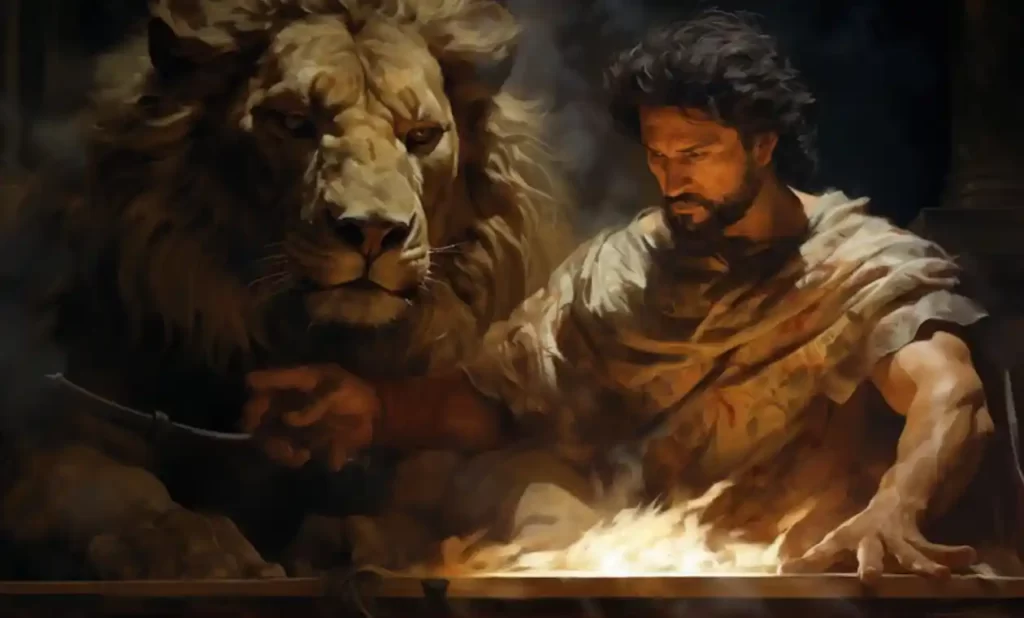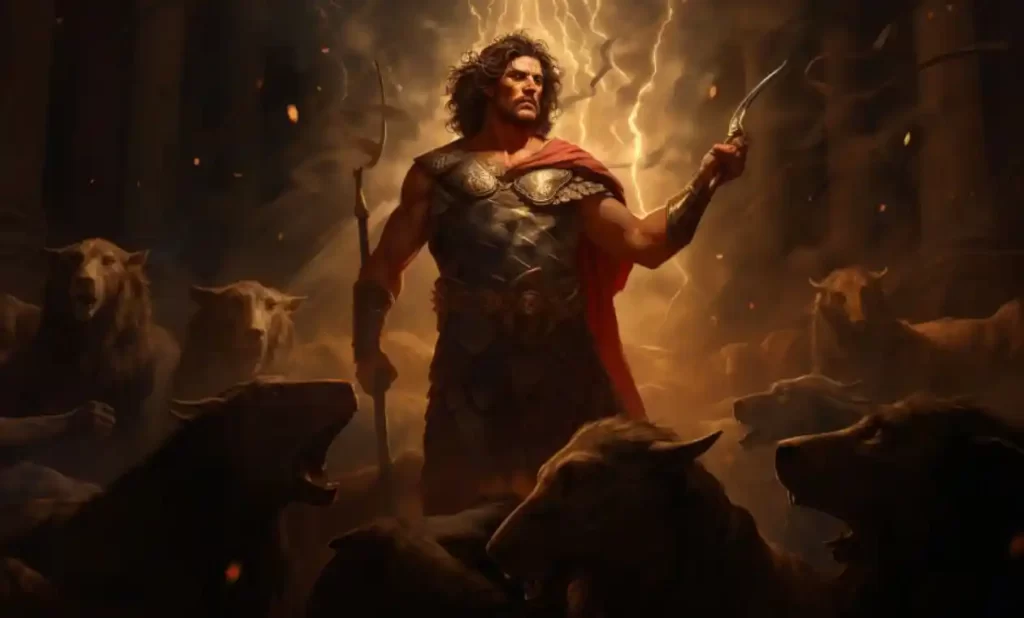
Imagine a world where lush forests stretch as far as the eye can see, and the wild melodies of nature’s creatures fill the air. In the heart of Roman mythology, this world comes alive with the presence of Faunus – a deity unlike any other. As we venture into the depths of these untamed wildernesses, we encounter Faunus, the guardian of nature, wildlife, and the untamed forces of the Earth. With his goat-like attributes and an enchanting twinkle in his eye, Faunus has woven himself into the very fabric of the natural world, becoming a timeless emblem of its beauty and mystery. Let us embark on a journey to unveil the secrets of Faunus, a deity whose connection to the wild has stirred the imaginations of countless generations.
The Origins of Faunus:
In the realm where myths and legends intertwine, the story of Faunus’ origins unfolds like a tapestry of wonder. Born of ancient divinity and boundless wilderness, Faunus emerges as a deity with a lineage that stretches beyond the confines of time.
Faunus, with his goat-like visage and jovial spirit, traces his ancestry to the heart of Roman mythology. As the offspring of the divine and the untamed, he embodies the delicate balance between civilization and the wild, a bridge between two realms that often collide and harmonize.
Interestingly, Faunus shares a kindred connection with the Greek god Pan. Like a melody carried by the wind across the mountains, the echoes of their similarities resonate through the annals of mythology. Both deities are patrons of the wild, protectors of nature’s secrets, and guardians of the untamed corners of the Earth.
The parallels between Faunus and Pan are as enchanting as the forests they call home. With their goat-like attributes and playful demeanor, they mirror each other across cultures, revealing a universal reverence for the untouched landscapes that have inspired awe since time immemorial. As we delve deeper into Faunus’ realm, we uncover the threads that tie these two gods together, weaving a narrative that transcends borders and time itself.
Faunus’ Enchanted Realm:
Close your eyes and let your imagination take flight, for we are about to step into the realm that Faunus calls home – a world of untamed beauty, where the rustling leaves and echoing calls of creatures weave a symphony of nature’s wonders.
Picture vast woodlands that stretch to the horizon, their canopies creating a tapestry of green that dances with sunlight filtering through. Within this enchanted expanse, Faunus stands as a guardian, a silent sentinel of the wild. His presence reverberates through the rustling leaves, and his laughter mingles with the songs of the birds that serenade the forest.
As the protector of wildlife, Faunus watches over the inhabitants of his realm with a benevolent eye. He embraces the creatures, from the mightiest of beasts to the tiniest of insects, fostering a delicate harmony where predator and prey coexist in the intricate dance of nature. It is Faunus who blesses these woods with fertility, ensuring that life flourishes and the land yields its bountiful harvests.
Yet, Faunus is more than just a guardian of creatures; he is also a steward of the untamed forces that shape the world. The winds that whisper through the leaves, the rivers that carve their paths, and the cycles of birth and rebirth are all within his domain. The wilderness is not just his home, but an extension of his very essence, a manifestation of his boundless connection to the Earth.
The Nature of Faunus:

In the heart of the untamed wilderness, Faunus emerges as a figure of both mystique and familiarity, a deity who embodies the essence of nature itself. With a countenance adorned with goat-like features, he walks the line between the human and the wild, a harmonious blend of the two.
Faunus is often depicted as a youthful and rustic being, his form exuding an undeniable connection to the natural world. His hair, adorned with leaves and flowers, intertwines with the verdant tapestry of his realm. Goat-like legs carry him gracefully through the forests, a symbol of his affinity for the creatures that roam the woods. The horns that crown his head are not merely ornamental; they are a testament to his kinship with the very creatures he watches over.
Yet, it is not just his appearance that captures the imagination—it is the light in his eyes, a mischievous glint that hints at the secrets of the woods. Faunus is not a deity of stern authority but a playful presence, one who dances with the leaves and laughs with the brooks. His demeanor is gentle, his touch light as a breeze, and his laughter ripples through the woods like a song of joy.
In the tales told around campfires and whispered beneath the moon, Faunus’ laughter is said to awaken the spirits of the forest. His presence is a reminder that even in the heart of the wilderness, there exists a kindred spirit, a guide who navigates the realms of both nature and humanity. As we gaze upon his form and feel the warmth of his gaze, we are invited to embrace the wildness within ourselves, to cherish the untamed beauty that resides in the depths of our souls.
In the twinkle of Faunus’ eyes and the gentle curve of his smile, we find a reflection of the delicate
Faunus and His Companions:
In the heart of the wild, where the leaves whisper secrets and the rivers sing their eternal melodies, Faunus finds companionship that mirrors his affinity for nature’s untamed beauty. These are not mere mortals, but supernatural beings that dance between the realms of humanity and the wild—the nymphs and satyrs.
Nymphs, ethereal creatures born from the very essence of nature, are drawn to Faunus like the bees to nectar. They move gracefully through the woodlands, their laughter echoing in the clearings and their footsteps light as the morning dew. Faunus and the nymphs share a connection that transcends words, a silent understanding of the rhythms of the Earth. It is said that they dance together beneath the moonlight, their movements reflecting the intricate dance of life itself.
Satyrs, on the other hand, are playful spirits who embody the spirit of revelry and merriment. With goat-like features similar to Faunus, they are kindred spirits in the truest sense. These lively beings are known to join Faunus in his adventures, filling the woods with laughter that rivals the rustling leaves. Together, they celebrate the wildness of the world, embracing the uninhibited joy that nature offers.
As the sun sets and the stars emerge, tales of Faunus and his companions come to life. Nymphs are often seen bathing in crystal-clear springs, their laughter like the gentle ripples of water. Faunus, ever the protector, ensures their safety as they frolic. Satyrs, with their music and merry dances, infuse the woods with a sense of celebration, reminding all who witness their revelry of the boundless spirit of the Earth.
These stories are more than mere myths; they are reflections of the intricate connections between beings that span realms and generations. Faunus, with his heart open to the companionship of nymphs and satyrs, becomes a symbol of the unity that exists between the supernatural and the natural, a living embodiment of the harmony that can be found when humanity and the wild intertwine.
Festivals in Faunus’ Honor:
As the seasons shift and the world embraces the embrace of winter, the spirit of Faunus comes alive in a celebration that echoes through the woodlands and into the hearts of those who revere him. On the 5th of December, the festival of Faunalia unfolds, a joyful gathering that pays homage to the god of forests, wildlife, and the untamed forces of nature.
Imagine a world transformed by the spirit of Faunus—a world where the boundaries between man and nature blur, and the wild dances hand in hand with humanity. The festival is a time of revelry, when villagers and travelers alike venture into the heart of the woods to partake in a grand communion with the divine.
As the sun rises, the woods come alive with activity. The air is filled with laughter and music, as merry gatherings engage in outdoor games and dances. With garlands of leaves adorning their hair and masks of animals hiding their faces, people and spirits alike join the festivities, embracing the spirit of the wild with open hearts.
Offerings to Faunus take the form of freshly harvested fruits, nuts, and grains—symbols of the Earth’s bounty and the god’s role in ensuring fertility and prosperity. These gifts are laid before altars nestled among the trees, their simple beauty a testament to the symbiotic relationship between humans and the natural world.
Under the canopy of trees, stories are shared, laughter reverberates, and the world feels suspended in a timeless moment of harmony. The festival of Faunalia is more than a celebration; it is a reminder of the ancient bond between humanity and nature, a testament to the unbreakable thread that ties us to the Earth.
As the day draws to a close and the sun dips below the horizon, the echoes of the festival linger in the air like a whispered promise. Faunus’ presence, ever felt in the rustling leaves and the gentle sigh of the wind, lingers as a reminder of the unity that can be found when humans and the wild stand together. And as the woods return to their slumber, the spirit of Faunus lives on, forever entwined with the heart of the natural world.
Worship and Beliefs:

In the heart of ancient Rome, where reverence for nature was intertwined with daily life, the worship of Faunus took root as a way to honor the god of forests, wildlife, and the boundless forces of the Earth. The Romans, with their deep connection to the land, embraced rituals that celebrated the intricate dance between humanity and the untamed world.
Picture the devotees of Faunus gathering in sacred groves and woodland clearings, the air heavy with the scent of earth and leaves. These natural settings, chosen to mirror Faunus’ realm, served as portals between the mortal and the divine, where the boundaries between the human and the wild were blurred.
Rituals held in Faunus’ name were often characterized by their simplicity and authenticity. No grand temples or ornate altars were required, for the forest itself was considered the holiest of sanctuaries. Offerings of fruits, nuts, and freshly gathered flowers were laid at the feet of makeshift altars, their fragrant presence a testament to the Earth’s bounty and the god’s benevolence.
As the faithful gathered in these serene enclaves, their prayers echoed through the trees, carried on the wind to the ears of Faunus. It was in these moments of connection that the ancient Romans sought blessings for their fields, their livestock, and their families. Fertility and prosperity were not just empty wishes; they were tangible gifts sought from a deity who understood the rhythms of nature.
The rituals themselves were as diverse as the landscapes that adorned the Roman countryside. Some engaged in dances, imitating the playful steps of Faunus himself. Others shared tales of the wild, weaving stories of nymphs, satyrs, and the god himself into the fabric of their collective memory. These rituals were a tapestry woven with love and respect, a testament to the symbiotic relationship between humans and the world around them.
In the heart of these rituals, Faunus’ presence was felt like the gentle touch of a breeze, a reminder that the gods were not distant and aloof, but intricately woven into the fabric of everyday life. The worship of Faunus, in all its simplicity, spoke of a deeper understanding—a recognition that the wild was not to be tamed, but to be embraced and revered.
As the fires of the rituals flickered and the stars emerged in the night sky, the connection between the mortal and the divine remained unbroken. Faunus, guardian of forests and wildlife, stood as a bridge between two realms, a reminder that the wildness within us is as precious as the world that lies beyond our doorstep. And so, the ancient Romans carried their devotion like a torch, lighting a path of reverence that continues to burn in the hearts of those who cherish the untamed beauty of the Earth.
Tales of Faunus’ Benevolence:
In the heart of ancient legends, where the boundary between reality and myth blurs, tales of Faunus’ benevolence weave a tapestry of wonder that stretches across the ages. These stories speak of a deity whose compassion for the wild and its creatures transcends the boundaries of time, leaving an indelible mark on the hearts of those who hear them.
Amidst the whispering leaves and the dappled sunlight, the forest spirits share stories of Faunus’ interventions to protect the very essence of his domain—the forests and its wildlife. In one tale, as a group of hunters encroached upon his sacred woods, Faunus transformed their arrows into harmless blooms, teaching them a lesson in respect for all living things. His actions served as a reminder that the wild was not a realm to conquer, but a realm to honor and cherish.
But Faunus’ benevolence wasn’t limited to his immediate realm; it extended to the lands that depended on his blessings for their sustenance. In the heart of harvest season, when fields lay golden and ready for reaping, it was said that Faunus’ touch could be felt in every ear of corn and every ripened fruit. His blessings ensured bountiful yields, the reward of an unspoken contract between humanity and nature—a contract forged with respect and care.
The tales tell of Faunus dancing in moonlit clearings, his laughter mingling with the melodies of night creatures. In these moments, his connection to the wild is unmasked, and his role as both guardian and nurturer is revealed. His actions remind us that the wild is not just a backdrop to human life, but a realm that deserves its own reverence.
In the stories shared around firesides and passed down through generations, Faunus emerges as a symbol of hope and harmony. His interventions to protect the forests and wildlife paint a picture of a deity who values the interconnected web of life, teaching that the health of the land is intricately tied to the health of all its inhabitants.
As these tales are woven into the very fabric of the natural world, they become more than stories—they become lessons. Lessons in understanding the intricate balance that allows life to flourish, lessons in honoring the wildness within ourselves, and lessons in recognizing that we are not separate from nature, but an integral part of it. And so, as the stories of Faunus’ benevolence echo through the woods, they remind us that every act of kindness, every gesture of protection, is a reflection of the divine bond between humanity and the wild.
Faunus’ Legacy in Modern Times:
As the pages of history turn and the world evolves, the legacy of Faunus continues to cast its gentle shadow on modern perspectives of nature. His presence, woven into the fabric of ancient tales, is not a relic of the past but a living reminder of the intrinsic connection between humanity and the wild.
In a world that often seeks to tame and conquer, Faunus emerges as a beacon of wisdom, his goat-like attributes a reminder that within every human heart beats the untamed spirit of the wild. His enduring influence reminds us that while cities rise and technologies advance, the wild remains an integral part of our existence—a force that cannot be ignored or subdued.
Faunus’ symbolism resonates in the hearts of those who advocate for the preservation of nature and the coexistence of all living beings. His legacy echoes in the rustling leaves and the rushing waters, urging us to listen to the symphonies of the Earth and to tread lightly upon its fragile landscapes.
As we reflect on the lessons Faunus imparts, we find ourselves at a crossroads, faced with the pressing need to safeguard the environment for future generations. His stories, once shared by firelight, now find new platforms—books, documentaries, and conversations that weave his wisdom into the tapestry of modern consciousness.
The legacy of Faunus speaks to a truth that transcends time: that the Earth is not merely a resource to exploit, but a living, breathing entity to respect, nurture, and cherish. His legacy encourages us to embrace the wild within us, to celebrate the intricate dance of life, and to recognize that our actions ripple through the delicate balance of the natural world.
In the depths of urban jungles and untouched wildernesses alike, Faunus’ spirit lingers. His legacy, written in the leaves and carried by the wind, is an invitation to each of us—a call to remember that we are stewards of this planet, entrusted with the responsibility to coexist harmoniously with all its inhabitants.
As the modern world grapples with its relationship to nature, Faunus’ legacy remains an unwavering compass, guiding us back to the untamed beauty that surrounds us. In his stories, his laughter, and his gentle presence, we find the courage to face the challenges of today and the inspiration to leave a legacy of our own—a legacy that reflects the unbreakable bond between humanity and the wild.
Conclusion:
In the tranquil depths of the Roman wilderness, the legacy of Faunus continues to whisper through the leaves, a timeless reminder of the unbreakable bond between humanity and the natural world. As his spirit roams through the forests and dances upon the wind, Faunus stands as a symbol of the harmonious coexistence that is woven into the very fabric of existence.
From ancient tales to modern reflections, Faunus’ presence endures, a testament to the enduring power of nature’s allure. He teaches us that the untamed beauty of the Earth is not something to be conquered, but a treasure to be cherished. His laughter, his companionship with nymphs and satyrs, his protection of forests and blessings on the land—all of these embody a wisdom that transcends generations.
As we navigate the complexities of the modern world, Faunus’ legacy guides us back to the simplicity of our connection with nature. In his stories, we find echoes of our own journey—an invitation to listen to the whispering leaves, to revel in the wildness within us, and to tread upon the Earth with reverence.
And so, as the winds carry the spirit of Faunus across time and space, we are reminded that our relationship with the wild is not a mere chapter in history, but an ongoing dialogue that shapes our present and molds our future. With every step we take in harmony with the environment, with every decision that reflects our respect for all living beings, we honor the legacy of Faunus—a legacy that inspires us to weave our own tales of connection, preservation, and harmony with the untamed beauty of the Earth.
Hey kids, how much did you like Faunus – The Benevolent Guardian of Nature in Roman Mythology? Please share your view in the comment box. Also, please share this story with your friends on social media so they can also enjoy it, and for more such Roman Mythology, please bookmark storiespub.com.
Related Article –





